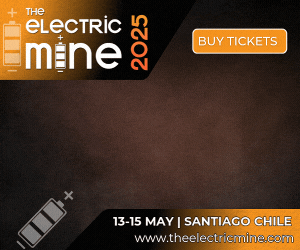ABB’s contributions to Chile’s mining sector demonstrate the possibilities of aligning sustainability with economic growth. With a clear focus on electrification, digitalization, and renewable energy, ABB and its partners in Chile are setting the standard for sustainable mining.
In a recent interview, Joachim Braun, President of ABB Process Industries, discussed ABB’s contributions to the mining sector in Chile, emphasizing the importance of sustainable development. As mining continues to play a vital role in Chile’s economy, companies like ABB are paving the way for greener, more efficient extraction processes.
Mining: An indispensable industry for global progress
Mining provides essential materials required for everyday life, from smartphones to public infrastructure and electric networks. "Much of the materials we depend on are difficult, if not impossible, to substitute," Braun explained. While recycling efforts are increasing, the demand for new materials remains high, driving the need for sustainable mining operations.
Chile, which generated 11.9% of its GDP from mining in 2023, is a prime example of a country leveraging its natural resources to meet global demand for essential minerals like copper.
ABB: A legacy of innovation and decarbonization
With a presence in Chile since 1955, ABB has long partnered with local mining companies to implement new technologies. "ABB has been active in the mining sector for over 130 years. Today, our role as electrical engineers is central to the industry's decarbonization," Braun stated. The transition to electrification is key to reducing the environmental impact of mining, and ABB offers innovative solutions such as mine hoists, gearless mill drives, and electric conveyor belts to increase efficiency while lowering carbon footprints.
Balancing productivity and sustainability
One of the challenges facing the mining sector is finding the balance between sustainability and productivity. According to Braun, ABB aims to help companies become greener without compromising profitability. Automation and digitalization play a crucial role in this process, allowing mines to operate efficiently while minimizing their environmental impact.
"Chilean mining companies like Codelco and Antofagasta Minerals are pioneers in sustainable practices," Braun added. "They are committed to cleaner mining methods while maintaining high productivity."
Chile as a global leader in sustainable mining
Chile is well-positioned to become a global reference in sustainable mining, thanks to its advanced adoption of digital and electric technologies. Braun highlighted that the public ownership structure of Chilean mining companies has encouraged long-term thinking and innovation. ABB has already introduced cutting-edge technologies, such as battery-operated trucks and trolley lines, giving Chile’s mining sector a competitive edge.
"The demand for sustainably mined minerals is increasing globally. If Chile capitalizes on this trend, it will solidify its leadership in the green economy," Braun remarked.
Renewable energy: A cornerstone of Chile’s future
During the Global Energy Transition Congress in Milan, ABB discussed strategies to meet climate goals, including tripling renewable energy production. Chile's vast potential in solar, wind, and hydro energy, along with opportunities for energy storage due to its diverse geography, make it a prime candidate for achieving these targets.
"The combination of renewable energy and sustainable mining will bring significant economic and environmental benefits," Braun noted. "The growing demand for electric vehicles and renewable energy infrastructure further boosts the need for Chilean copper, as these technologies require far more copper than their conventional counterparts."
The economic impact of green technologies
Transitioning to sustainable practices offers substantial economic benefits for Chile. Many global industries are now prioritizing sustainably mined materials to meet their environmental commitments. For example, electric vehicle manufacturers require up to eight times more copper than conventional vehicles, creating new opportunities for Chile's mining sector.
Braun emphasized, "Sustainably mined materials will be in high demand. Conventional mining will likely decline, but Chile can seize the opportunity by positioning itself as a leader in green mining." Additionally, investments in renewable energy infrastructure will foster a skilled workforce, further enhancing Chile’s economic prospects.
Copper: Essential for the energy transition
Copper’s unparalleled conductivity makes it indispensable for energy transmission, electric vehicles, and renewable energy production. "Wind turbines and electric cars require far more copper than traditional technologies, ensuring a bright future for the copper industry," Braun explained. While recycling will play a role, new copper production will still be necessary to meet the growing demand.




